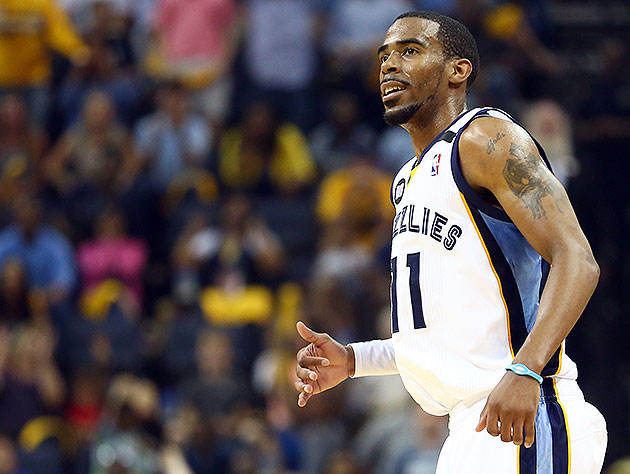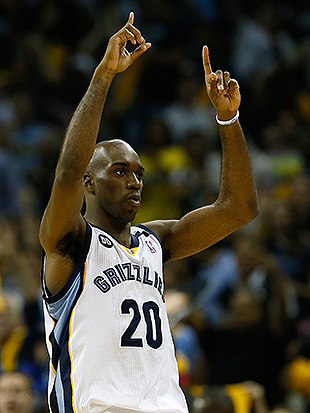
The Memphis Grizzlies enter Monday's Game 4 just 48 minutes away from watching far and away the most successful campaign in franchise history come to an end at the hands of a San Antonio Spurs squad that has seemed to have the right answer at just about every turn over this series' first three games. In the search for responses of their own, the Grizzlies need sharper play in several areas, a little bit of luck and, maybe, a roll of the dice on a lineup switch if they want to keep their season alive.
Let's take a closer look at a handful of areas of interest heading into a must-win Game 4:
1. Create turnovers and score points off them. Memphis has outscored San Antonio in just four of the 14 quarters/overtime periods in this series. Only one — the third quarter of Game 2, in which Memphis shot 64.7 percent from the floor, grabbed five offensive rebounds and took 14 free throws — came as a result of the Grizzlies getting going on offense. In the other three — the second quarter of Game 1, fourth of Game 3 and first of Game 4 — San Antonio committed 16 turnovers that led to 25 Memphis points, making up the bulk of the total point differential (+31) in those frames.
Nowhere has the difference been more stark than in Game 3. After the first 12 minutes, the Grizzlies had forced eight Spurs turnovers and scored 11 points off them — the aggressive and opportunistic defense of Mike Conley and Tony Allen up top had scuttled San Antonio's Tony Parker-helmed, dribble-penetration-based attack, resulting in the Grizzliest quarter of the series, a rollicking Grindhouse and a 16-point Memphis lead.
After that, though, the Grizzlies forced just nine Spurs turnovers and scored 14 points off them; the pressure dissipated, the penetration came back, the rhythm resumed and the onslaught was on, with the Spurs outscoring Memphis by 27 points over the next 41 minutes. The reversal of fortune became complete in overtime, as San Antonio didn't have a turnover in a nearly perfect period — 18 points on nine trips, 8 for 10 from the floor with an offensive-rebound putback on one of the two misses and two and-ones — that pushed the Grizzlies to the brink.
Basically, the Grizzlies have only really endangered the Spurs when the Spurs have helped. When they haven't, San Antonio has completely outpaced, outfoxed, outexecuted and outclassed Memphis, making the league's No. 2-ranked regular-season D look more like a confused and helpless defensive unit. (The Grizzlies are allowing 10 more points per 100 possessions against the Spurs than they gave up on average during the season. Their conference finals defensive rating is a tick better than the mark that put the New Orleans Hornets in 28th place in the league this season.) The Grizzlies absolutely have to produce more of the sort of defensive disruption they managed in the opening quarter of Game 3 if they want any chance of extending the conference finals to a fifth game.
2. #YGTMYFT, man. We've been here before, Grizzlies — namely, before Game 2 against the Oklahoma City Thunder. When you can't reliably space the floor and create extra score-sheet value from long distance, every point matters, and Memphis has been turning its nose up at charity. Over the last two games, the Grizzlies have missed 16 free throws. The Spurs have won those two games by a total of 15 points.
It'd be overly simplistic to suggest that the Grizzlies have ostensibly played the Spurs even outside the foul line in those two games — as noted above, the bulk of Memphis' positive play has come in three quarters where San Antonio short-circuited — but it's impossible to ignore how much those missed opportunities hurt for a team that's so desperately struggled to score. (The Grizzlies are grinding their way to just 93.9 points per 100 possessions through three games, a level of offensive inefficiency worse than even the John Wall-less Washington Wizards posted this season.)
It's especially damaging considering how uncharacteristic the struggles are for a Grizzlies team that finished tied with the Chicago Bulls for ninth in the NBA in free-throw accuracy this season at 77.3 percent ... and considering that most of the damage is being done by Zach Randolph, a 75 percent shooter during the season who's struggling (7 for 16 over the last two games) at the worst possible time for a player who could really use the offensive kickstart of a few extra made freebies. (Two Tony Allen misses in four tries in the final 2:22 of regulation in Game 3 didn't help much, either.)
Obviously, there's no real Xs and Os answer for this; Randolph and his teammates just have to keep attacking, trust their preparation, step to the line with confidence and hope that the regression to the mean comes through on Monday.
3. Stay more disciplined in defending the pick-and-roll, especially on the roll man. The Spurs absolutely carved up the Grizzlies in the pick-and-roll in Game 3, with 37 of their 109 offensive possessions (as charted by Synergy Sports Technology) finished by either a pick-and-roll ball-handler or a roll man and San Antonio utterly cleaning up on those trips, scoring 40 points on 18 for 27 shooting.
While it's not especially stunning that a screen-game-based attack led by the likes of Tony Parker and Manu Ginobili would find success scoring on plays finished by the ball-handler — the Spurs scored the league's sixth-highest number of points per possession on such plays this season, and the Grizzlies ranked 18th of 30 NBA teams in defending them — where San Antonio really put on a clinic was on hitting the screener for buckets, with Spurs roll men (largely Duncan and Tiago Splitter) going 9 for 11 with just one turnover in 13 possessions as Memphis just couldn't keep up with San Antonio's execution.
The damage was especially acute in overtime, in which the Spurs outscored the Grizzlies 18-7, and as The Basketball Jones' Trey Kerby noted, the leakage was led, somewhat surprisingly, by Defensive Player of the Year Marc Gasol. Coach Nick of BBall Breakdown takes a closer look at the openings the Grizzlies kept leaving in their pick-and-roll coverage, and how the Spurs repeatedly exploited them:
The good news: Given some film study to grade his breakdowns, there's a chance that Gasol will be more disciplined in his hedging and smarter in the angles he takes in Game 4, and the Grizzlies did have some success at limiting pick-and-roll damage in Game 1 (21 points on 10 for 21 shooting on 28 possessions) and Game 2 (12 points on 6 for 21 shooting on 29 possessions). The bad news: Memphis still lost both of those games.
4. Get Tim Duncan off the court. Maybe the Grizzlies can, like, give Duncan a cool car, or tickets to go watch "Fast & Furious 6," or an all-expenses-paid trip to the secret afterparty of the just-wrapped ConQuest sci-fi convention in Kansas City or something. Anything that gets him off the floor. Because when he's on it ... yikes. Consider:
• San Antonio is +42 points in the 103 minutes Duncan has played in this series; Memphis is +5 in the 51 minutes he's been out;
• Memphis' best offensive quarter of the series — the aforementioned third in Game 2, in which they scored 33 points on 11 for 17 shooting — came after Duncan picked up three fouls in 30 seconds and sat for the final 7:51 of the quarter;
• Memphis has gotten to the foul line way more frequently without Duncan defending the rim, generating 29 free-throw attempts in 51 Timmy-less minutes and 35 in the 103 minutes he's played;
• Thanks in part to the need for increased help inside, the Grizzlies have created more frequent (24 in 51 minutes, compared to 25 in 103) and higher-quality (41.7 percent when he sits, 28 percent when he plays) 3-point looks with no Duncan;
• The Grizzlies are scoring an average of 86.8 points per 100 possessions with Duncan on the floor and 107.4-per-100 with him off the floor, meaning he's basically been the difference between them scoring like the Denver Nuggets or scoring like the very worst offense in the league when everybody has food poisoning.
Unfortunately for Grizzlies fans, trying to get Duncan in foul trouble would figure to mean relying even more heavily on bulling the ball inside, and Memphis hasn't had much success at that when he's in the game, shooting just 39.1 percent in the restricted area while he plays compared to 50 percent when he's not (which still isn't great, but is, y'know, way better). Plus, a game called more tightly wouldn't seem to favor a swiping, reaching, physical Grizzlies squad, and Duncan seemed to get a better grasp of the officiating on Saturday, keeping the whistles at bay en route to managing 44 minutes of brilliant ball (24 points, 10 rebounds, five assists, two blocks) in San Antonio's Game 3 win.
So, yeah. Those "Fast 6" tickets are sounding like a better idea by the second.
 5. Move Quincy Pondexter into the starting lineup in exchange for Tayshaun Prince. It might be too little, too late, and I can understand why coach Lionel Hollins might prefer to have the veteran Prince in the lineup, but both the numbers and the eye test suggest Memphis' best chance to extend things involve more minutes for Pondexter, and preferably with better line-mates. To wit:
5. Move Quincy Pondexter into the starting lineup in exchange for Tayshaun Prince. It might be too little, too late, and I can understand why coach Lionel Hollins might prefer to have the veteran Prince in the lineup, but both the numbers and the eye test suggest Memphis' best chance to extend things involve more minutes for Pondexter, and preferably with better line-mates. To wit:
• Prince in the series: Five points in 22.2 minutes per game on 35.3 percent shooting, one 3-point attempt (which, to his credit, he made). Pondexter in the series: 13 points in 31.4 minutes per game on 50 percent shooting and a 47.4 percent mark from 3-point range on 19 attempts. So, that's better.
• While the minute allotment suggests Hollins realizes Pondexter offers more punch than Prince at this stage of the game, as Chris Herrington of the Memphis Flyer noted, the rotation choices don't line up. When Pondexter shares the floor with Gasol and Mike Conley, Memphis is outscoring San Antonio by 19.1 points per 49 minutes and producing a net efficiency rating — how many points you score per 100 possessions versus how many you allow — of +17.9. Yet the trio has played only 45 minutes together over the series' first three games.
No, Pondexter's not some sort of be-all-end-all offensive savior, and yes, relying on him more heavily in big minutes leaves you susceptible to the kind of defensive breakdowns the Spurs exploited by using Ginobili offensively to pick on Pondexter on consecutive late-fourth-quarter possessions in Game 3. But if you're going to go down, you might as well go down shooting, and given the paucity of options on the Memphis bench, it's clear as day that Pondexter's the best shooter Hollins has at his disposal. Rolling the dice with the Washington product might not be Memphis' saving grace, but more Gasol-Conley-Pondexter time is certainly worth a try if the Grizzlies hope to push this series back to San Antonio.
No comments:
Post a Comment